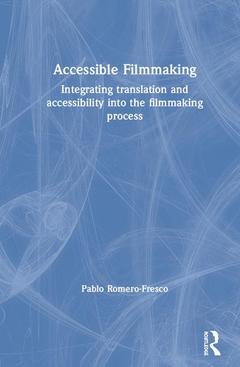Description
Accessible Filmmaking
Integrating translation and accessibility into the filmmaking process
Author: Romero-Fresco Pablo
Language: English
Subjects for Accessible Filmmaking:
Keywords
Stanley Kubrick Archive; Creative subtitles; VRT; Voice-over; Accessible Versions; Integrating translation; Slab Serif Font; Transcription; Ad; Cinematography; Filmmaking Process; Audiodescription; AVT; Subtitling for the deaf and hard of hearing; Subtitling; Audio Description; Dubbing; Serif Font; Audiovisual Translation; Media Accessibility; Visual Momentum; Sensory-Impaired Audiences; Deaf Viewers; Pablo Romero-Fresco; Inglourious Basterds; Accessible Filmmaking; AFM; award-winning film; SDH; Multilingual Films; filmmaking workflow; Integrated Titles; exhibition platforms; Sans Serif Font; Ivory Coast; Accessibility Process; Eye Trace; Transition Shots; McGurk Effect; Stanley Kubrick
Publication date: 05-2019
· 15.6x23.4 cm · Hardback
Publication date: 05-2019
· 15.6x23.4 cm · Paperback
Description
/li>Contents
/li>Readership
/li>Biography
/li>
Translation, accessibility and the viewing experience of foreign, deaf and blind audiences has long been a neglected area of research within film studies. The same applies to the film industry, where current distribution strategies and exhibition platforms severely underestimate the audience that exists for foreign and accessible cinema. Translated and accessible versions are usually produced with limited time, for little remuneration, and traditionally involving zero contact with the creative team.
Against this background, this book presents accessible filmmaking as an alternative approach, integrating translation and accessibility into the filmmaking process through collaboration between translators and filmmakers. The book introduces a wide notion of media accessibility and the concepts of the global version, the dubbing effect and subtitling blindness. It presents scientific evidence showing how translation and accessibility can impact the nature and reception of a film by foreign and sensory-impaired audiences, often changing the film in a way that filmmakers are not always aware of. The book includes clips from the award-winning film Notes on Blindness on the Routledge Translation Studies Portal, testimonies from filmmakers who have adopted this approach, and a presentation of the accessible filmmaking workflow and a new professional figure: the director of accessibility and translation.
This is an essential resource for advanced students and scholars working in film, audiovisual translation and media accessibility, as well as for those (accessible) filmmakers who are not only concerned about their original viewers, but also about those of the foreign and accessible versions of their films, who are often left behind.
1. Introduction: the end of a long divorce
2. Setting the scene: in support of a wider notion of accessibility, translation and film
3. AVT and MA for Filmmakers
4. Integrating translation and accessibility into the filmmaking process
5. Integrating AFM into the filmmaking industry
6. Conclusions
Bibliography
Index
Pablo Romero-Fresco is Ramón y Cajal researcher at Universidade de Vigo (Spain) and Honorary Professor of Translation and Filmmaking at the University of Roehampton (London, UK). He is the author of Subtitling through Speech Recognition: Respeaking (Routledge) and the editor of The Reception of Subtitles for the Deaf and Hard of Hearing in Europe (Peter Lang). He is on the editorial board of the Journal of Audiovisual Translation (JAT) and is currently working with several governments, universities, companies and user associations around the world to introduce and improve access to live events for people with hearing loss. His Accessible Filmmaking Guide is being used by many international public broadcasters, universities and producers to introduce a more inclusive and integrated approach to translation and accessibility in the filmmaking industry. He is the leader of the international research centre GALMA (Galician Observatory for Media Accessibility), for which he is currently coordinating several international projects on media accessibility and accessible filmmaking, including "ILSA: Interlingual Live Subtitling for Access", funded by the EU Commission. Pablo is also a filmmaker. His first documentary, Joining the Dots (2012), was screened during the 69th Venice Film Festival and was used by Netflix as well as film schools around Europe to raise awareness about audiodescription.
Link to the author’s site: http://galmaobservatory.eu/member/pablo-romero-fresco/
Link to GALMA: http://galmaobservatory.eu/

